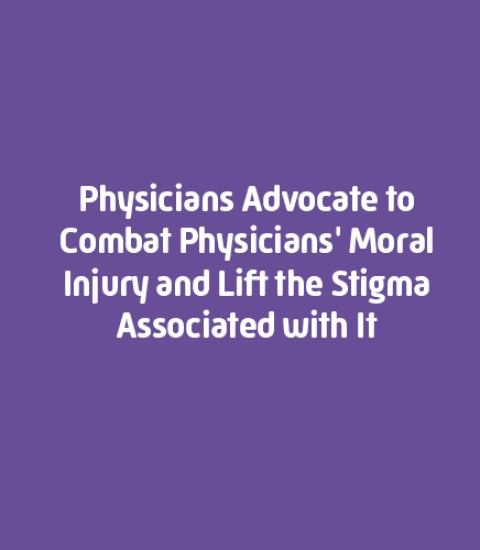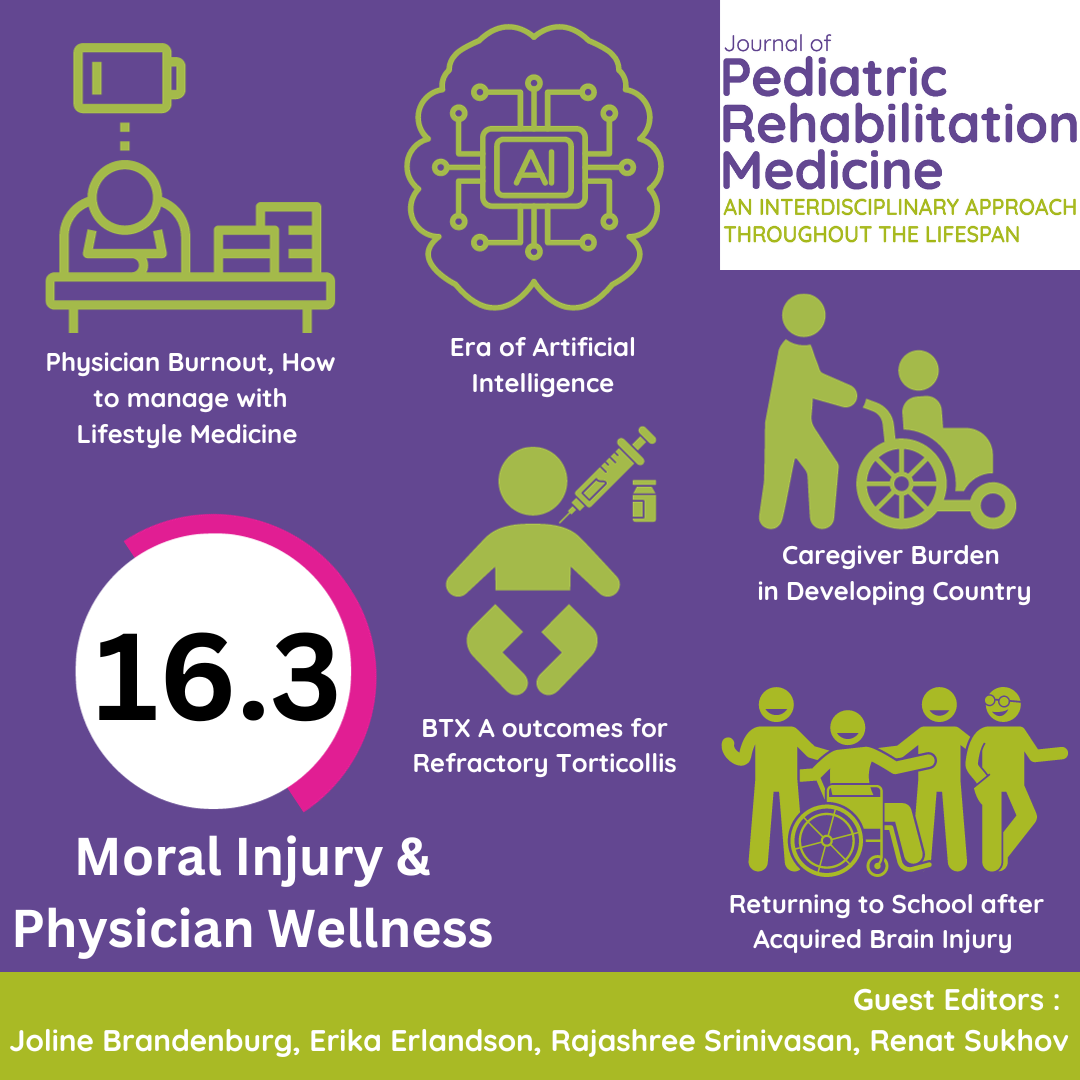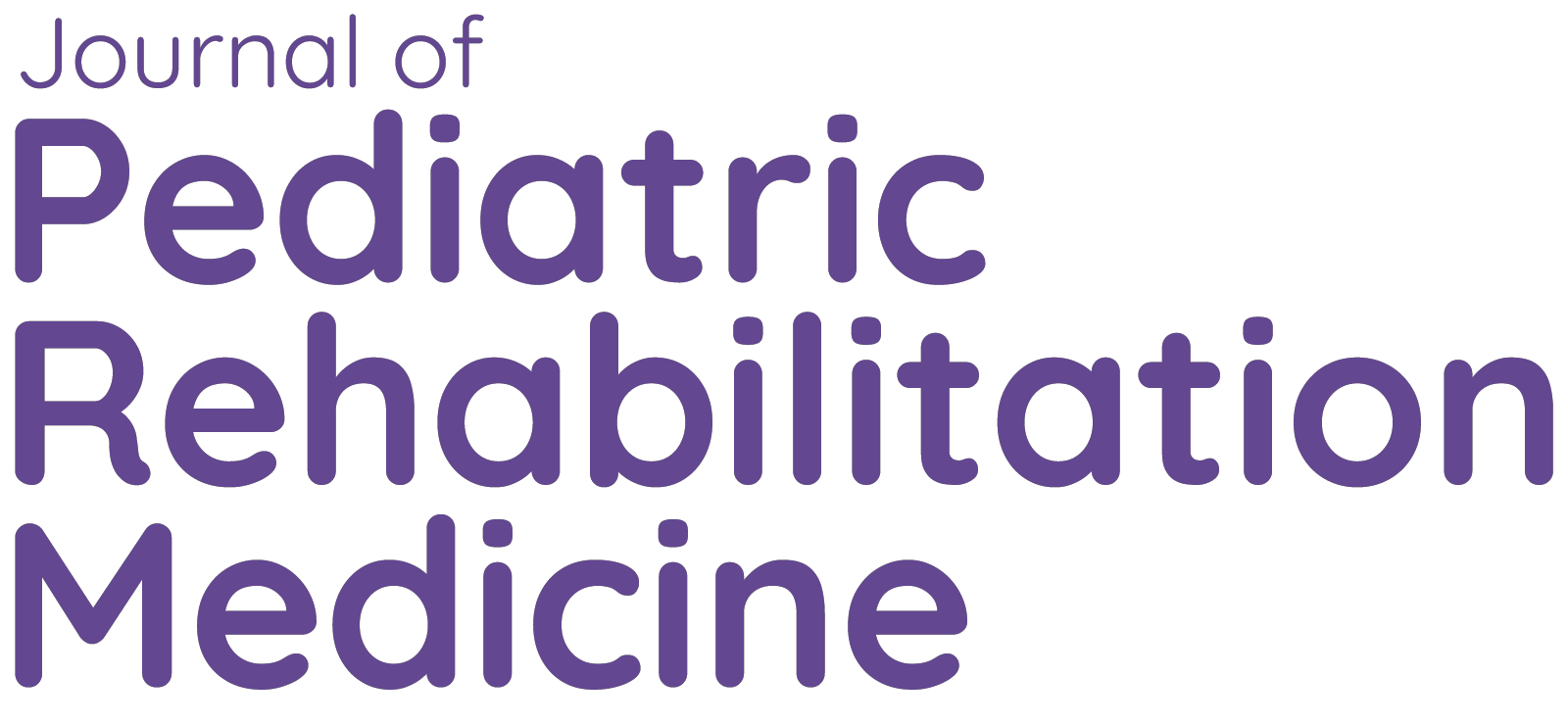
Amsterdam, November 2, 2023 – Depression, suicidal ideation, burnout, and moral injury are on the rise among physicians working in the US healthcare system. A collection of articles in the Journal of Pediatric Rehabilitation Medicine (JPRM), published by IOS Press, addresses the stressors leading to physicians' moral injury among practitioners of pediatric rehabilitation medicine and more broadly among all healthcare professionals, and provides insightful recommendations for improving healthcare professionals' mental wellness. "Lives may depend on it."
Guest Editor of this issue of JPRM, Joline Brandenburg, MD, Mayo Clinic, Rochester, MN, writes, "While moral dilemmas are ubiquitous in medicine, moral injury refers to the psychological distress associated with one’s own actions (or lack of them) when they are at odds with one’s beliefs or values in association with a medical system that constrains the physician’s ability to best care for the patient. The concept of moral injury shifts the blame of burnout from the physician and their ‘inability to cope’ to healthcare organizations and systems."
This issue of JPRM is a call to action to address the stressors in the US healthcare system that are beyond the control of physicians. These include revenue generation, administrative issues surrounding the electronic medical record (EMR), patient satisfaction metrics, and health insurance barriers. The burden of these non-direct patient clinical care activities can lead to moral injuries, burnout, depression, and suicide and point to the impending need for meaningful reforms by legislation, hospital administration, and licensing authorities to prevent physician suicides.
Physicians have one of the highest suicide rates of any profession. More than half of physicians know a physician who has either considered, attempted, or died by suicide in their career. An estimated 119 physicians die by suicide every year in the US. The Guest Editors call for action to remove the stigma on mental health issues among physicians. They suggest a multimodal approach including adjustment of the healthcare system’s expectations of physicians, shift in culture surrounding physician wellness, and returning physician autonomy, as well as honest and transparent discussion on the negative impact of excessive corporatization of medicine on physician burnout rate.
One of the articles in the issue, “Medicine shouldn’t be this hard: The intersection of physician moral injury and patient healthcare experience in pediatric complex care,” tells the heart-wrenching story of 13-year-old Dani, who was diagnosed with an autoimmune disorder. Their preferred treatment was denied by the insurer, there were six different healthcare systems involved, causing chaos in maintaining their EMR, and the hospital wanted to send them to another facility 60 miles away for financial reasons.
"Health insurance policy should not interfere with physician decision-making, and necessary medical treatment must be available to patients without significant barriers," says Guest Editor Erika Erlandson, MD, Departments of Pediatrics and Physical Medicine and Rehabilitation, Michigan State University College of Osteopathic Medicine. "Furthermore, reducing the EMR burden on both physician and patient must start with true system interconnectivity and follow with more intuitive user interfaces. Finally, health systems must recommit to aligning their values with the patient, rather than profit, as their priority. Sharing stories, caring for one another, and employing successful wellness principles are ways physicians can immediately contribute.”
In “Our stories matter,” the authors talk about the challenges they faced in their professional journeys, encouraging others to share their struggles as well. Guest Editor Rajashree Srinivasan, MD, Children’s Health, Dallas, explains, "All too often, physicians suffer moral injury, burnout, depression, anxiety, and suicidal thoughts in silence and alone. Some may feel ashamed, weak, or vulnerable. In telling our stories, we show our strength, hope, and resilience, which were made possible by appropriate interventions. We have a voice and opportunity to show that we are not ashamed of our experiences, but rather, we are empowered."

Guest Editor and JPRM Associate Editor Renat Sukhov, MD, Department of Rehabilitation Medicine, New York University, NYU Langone Health Medical Center, elaborates, "While the Accreditation Council for Graduate Medical Education has been quite active in addressing wellness for physicians in training, this proactive approach for all physicians has not been systematic. The signing of the Dr. Lorna Breen Health Care Provider Protection Act (P.L.117-105) in 2022 establishes national initiatives to address mental health and resiliency for healthcare students all the way to practicing professionals."
Mitigation of physician burnout can be potentially achieved with innovative approaches such as use of artificial intelligence. Idiosyncrasies of healthcare delivery for children with complex needs necessitate direct participation of pediatric experts to design these technological platforms.
The position paper “Physician distress: Where are we and what can be done” not only looks at the current state of the healthcare system and culture, but also provides hope for future improvements. Dr. Brandenburg notes, "The culture of medicine and physicians themselves have contributed to the stigma of mental health conditions. There is a history of shame and silence surrounding mental illness in medicine, including a reluctance to disclose a concern to others, and this needs to change. "
JPRM Editor-in-Chief Elaine L. Pico, MD, FAAP, FAAPM&R, UCSF Benioff Children’s Hospital Oakland, comments, “In launching this Moral Injury and Physician Wellness special issue, we highlight Wendy Dean and Simon Talbot's 2023 book, If I Betray These Words, which is reviewed in this issue. It acknowledges the plight of our founding JPRM Editor-in-Chief, Jacob Neufeld. Physician struggles, wellness and solutions are also discussed. Please join us by embracing the first of our JPRM special issues on this critical topic of moral injury, physician wellness, and moral repair, which are especially critical to the pediatric rehabilitation community and our patients, whose care is often complex and interdisciplinary.”
According to Dr. Dean, “Since publishing If I Betray These Words, I receive daily messages from clinicians who are experiencing moral injury – they know what patients need but can’t get it for them because of constraints imposed by healthcare systems run like big businesses. The strain is unsustainable and it's time for better healthcare – for patients and for the workforce.”
Dr. Brandenburg concludes, "As physicians, we recognize the fundamental value of every patient’s life, and it is time we recognize the fundamental value of our own."
###
NOTES FOR EDITORS
Moral Injury and Physician Wellness
Journal of Pediatric Rehabilitation Medicine, Volume 16:3, published by IOS Press
The collection of articles is openly available at https://content.iospress.com/journals/journal-of-pediatric-rehabilitati…
Guest Editors:
Joline Brandenburg, MD, Mayo Clinic, Rochester, MN
Erika Erlandson, MD, Departments of Pediatrics and Physical Medicine and Rehabilitation, Michigan State University College of Osteopathic Medicine
Rajashree Srinivasan, MD, Children’s Health, Dallas
Renat Sukhov, MD, Department of Rehabilitation Medicine, New York University (NYU), NYU Langone Health Medical Center
Highlighted articles:
“Medicine shouldn’t be this hard: The intersection of physician moral injury and patient healthcare experience in pediatric complex care,” by Erika Erlandson, Carrie Ramirez, and Wendy Dean (https://doi.org/10.3233/PRM-230027)
“Our stories matter,” by Joline E. Brandenburg, Erika E. Erlandson, and Rajashree Srinivasan (https://doi.org/10.3233/PRM-239017)
“Physician distress: Where are we and what can be done,” by Joline E. Brandenburg, Billie A. Schultz, Cara C. Prideaux, and Sherilyn W. Driscoll (https://doi.org/10.3233/PRM-230032)
“Review of If I Betray These Words by Wendy Dean with Simon Talbot,” by Stephen R. Skinner (https://doi.org/10.3233/PRM-230023)
Publication of this special themed issue coincided with National Physician Suicide Awareness Day, observed on September 17, 2023.
Contact Eileen Leahy, IOS Press, at +1 732-406-1313 or e.leahy@iospress.com for additional information. Journalists who wish to interview the Guest Editors or authors should contact Sara Tinsley, Managing Editor, Journal of Pediatric Rehabilitation Medicine, at jprmst@gmail.com.
ABOUT THE JOURNAL OF PEDIATRIC REHABILITATION MEDICINE
Editor-in-Chief: Elaine L. Pico, MD, FAAP, FAAPM&R, UCSF Benioff Children’s Hospital Oakland
The Journal of Pediatric Rehabilitation Medicine (JPRM): An Interdisciplinary Approach Throughout the Lifespan is designed to parallel the multidisciplinary teams caring for children, adolescents, and adults with childhood-onset physical disabilities and complex care needs worldwide. Published quarterly, topics include, and are not limited to, cerebral palsy, traumatic brain injury, spinal cord injury, spina bifida, limb deficiency, muscular dystrophy, stroke, cancer, developmental delays, and rare disorders. Furthermore, the journal welcomes papers dedicated to pediatric rehabilitation from a global health perspective. https://jpedrehabmed.com
ABOUT IOS PRESS
IOS Press is an independent international scientific, technical, medical (STM) publishing house established in 1987 in Amsterdam. We produce around 90 journals and 70 books annually in a broad range of subject categories, primarily specializing in health and life sciences (including neurosciences, medical informatics, cancer research, and rehabilitation) and computer sciences (including artificial intelligence, data science, and semantic web). In addition, we offer specialized services that support scientific advancement. www.iospress.com
